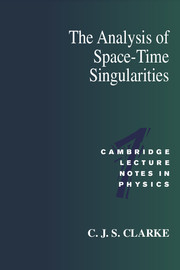7 - Extension theorems
Published online by Cambridge University Press: 05 August 2012
Summary
In this chapter I shall describe various situations in which it is possible to extend through a boundary point; in these cases the boundary point is not a singularity. As has been explained, we are proceding by elimination, so that the remaining cases must either be regarded as genuine singularities, or be amenable to extension by more powerful means than used here. There is no absolute criterion for what sorts of extension are “legitimate”, and hence no absolute criterion for what is, and what is not, a singularity.
Spherical symmetry
In this situation (which is of considerable interest because of the ease of obtaining exact solutions) it is possible to prove the existence of extensions under weaker assumptions than is normally the case. The results are thus not only of interest in their own right, but may be an indication of the “best possible” results that might be obtainable in the general case.
Definition of the problem
We shall be dealing with a space-time in which the rotation group SO(3,ℝ) acts transitively on spacelike 2-surfaces. So through every point p of the space-time there exists in a neighbourhood of p a totally geodesic timelike 2-surface S orthogonal to the orbits of the group; the surfaces maximal with respect to these properties through a given group orbit are equivalent.
- Type
- Chapter
- Information
- The Analysis of Space-Time Singularities , pp. 145 - 153Publisher: Cambridge University PressPrint publication year: 1994



